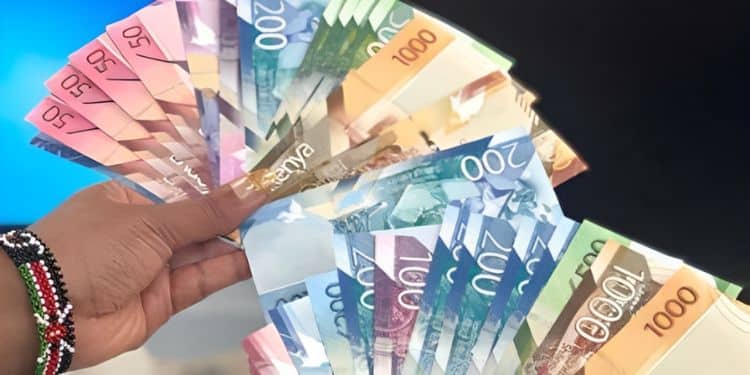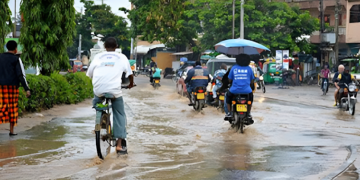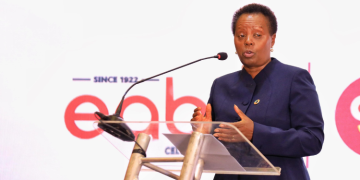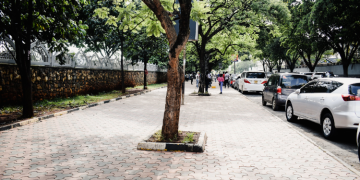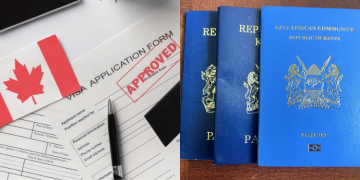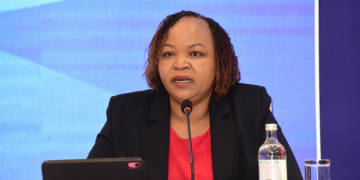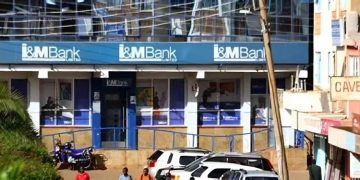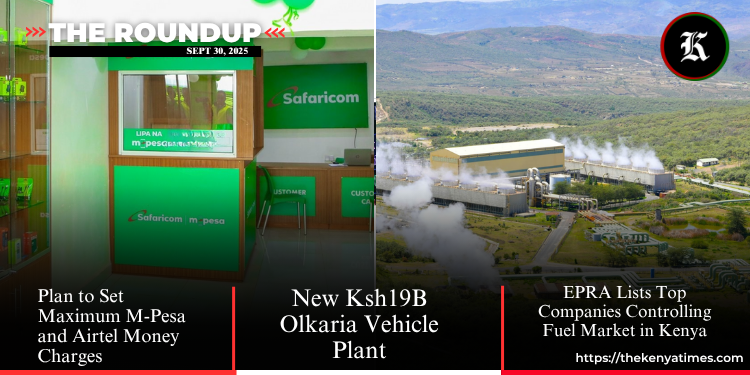Hello, I’m Annah. Welcome to today’s edition of The Business Roundup. In this issue, we examine loan rates across Kenyan banks as released by the Central Bank of Kenya (CBK), the proposed capping of M-Pesa and Airtel money transfer fees, the creation of more jobs as construction begins on a Ksh19 billion electric vehicle assembly plant in Naivasha, and other top business stories.
The Central Bank of Kenya (CBK) has released the average lending rates of commercial banks as of August 2025, highlighting trends in credit costs across various categories.
According to a CBK notice published on September 30, these categories include overdrafts, personal and household loans, asset finance, SME loans, corporate loans, and mortgages.
Overall, the industry’s average lending rate stood at 15.24 percent, while the average deposit rate was 7.24 percent.
Subscribe today and stay updated on top news stories in The Kenya Times Business Roundup. The Roundup presents a compilation of business stories that hit headlines throughout the week
Citibank N.A. Kenya emerged as the most affordable lender, with an average lending rate of 10.52 percent as of August 2025.
This was nearly five percentage points below the market average, giving corporate clients and high-value borrowers—Citibank’s primary customer base—a significant advantage.
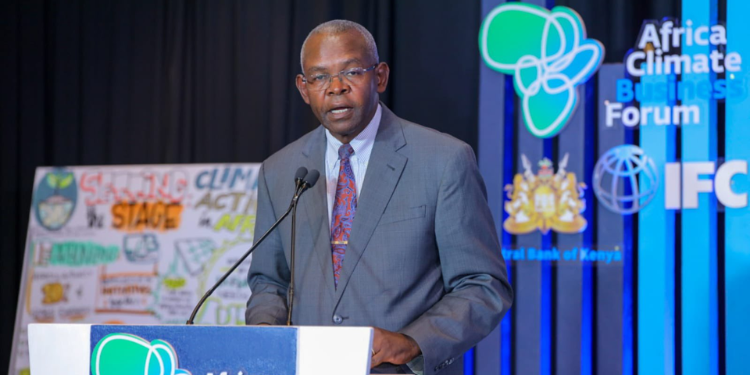
CBK Releases Banks with Cheaper Personal Loans
On the deposit side, Stanbic stood out for savers, offering the highest average return at 7.70 percent.
Citibank paid 7.56 percent, while Gulf African Bank, Prime Bank, and Standard Chartered each offered 7.50 percent, providing competitive choices for depositors seeking to grow their savings.
Stanbic Bank Kenya ranked second in affordability with an average lending rate of 11.94 percent, while Standard Chartered Bank Kenya came in third at 12.33 percent. Guaranty Trust Bank (GTBank) and Ecobank rounded out the top five cheapest lenders, with rates of 12.91% and 13.44%, respectively.
At the other end of the spectrum, Credit Bank and Access Bank (Kenya) PLC had the highest lending costs.
Credit Bank posted an average lending rate of 19.87 percent, while Access Bank followed closely at 19.52 percent.
Middle East Bank, Commercial International Bank (CIB) Kenya, and SMEP Microfinance Bank also ranked among the most expensive, with lending rates averaging above 18.70 percent in August.
Kenyan Firm Aquilastar Starts Ksh 19 Billion EV Assembly Plant with UAE-Investor Backing
Kenya has taken another major step toward clean mobility after a local firm, Aquilastar Corporate Investment, backed by a United Arab Emirates (UAE) investor, broke ground on a Ksh19.37 billion ($150 million) electric vehicle (EV) assembly and accessories plant at KenGen’s industrial park in Olkaria, Naivasha.
Aquilastar aims to produce 50,000 EV units annually and create 13,000 direct and indirect jobs with financial backing from the UAE-based Alsayegh Group, a conglomerate with interests in technology, financial services, education, automotive, and oil and gas.
“For Aquilastar, Olkaria is more than a factory site — it is the launch pad of a new mobility future for Kenya, Africa, and the world,” said Abdulatif Alsayegh, chairman of Aquilastar, during the groundbreaking event over the weekend.
Aquilastar says the move could help cut Kenya’s fossil fuel import bill, which currently stands at over Ksh600 billion annually, while positioning the country as a regional hub for EV manufacturing.
KenGen Chairman Alfred Agoi stated that the project is expected to boost green industrialization and create thousands of jobs.
“We are going to generate 3,000 jobs directly and over 10,000 jobs indirectly. We are also interested in them trying to source local raw materials as part of their manufacturing plants,” he said.
KenGen added that the project will be powered by reliable geothermal energy, aiming to generate 1,500 megawatts of clean power by 2034.
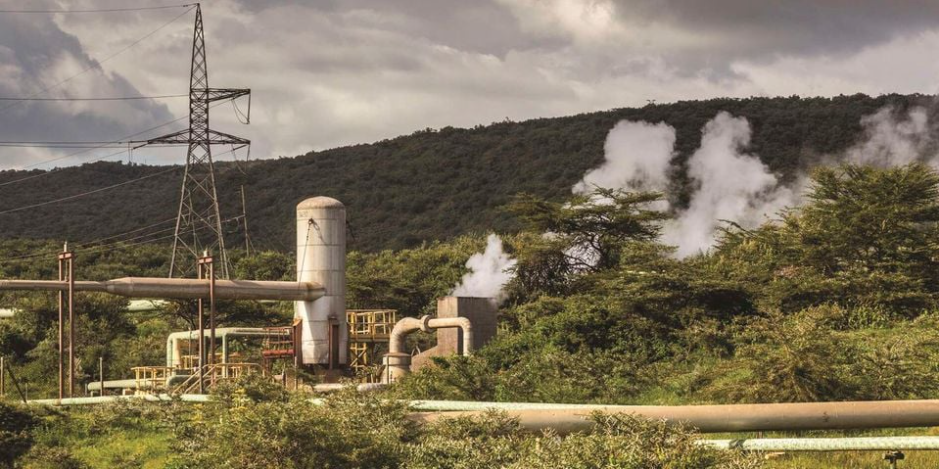
CBK to Cap Fees for M-Pesa and Airtel Money Transfers
Meanwhile, the Central Bank of Kenya (CBK) has revealed plans to cap the fees charged on person-to-person mobile money transfers on Safaricom’s M-Pesa and Airtel Money services.
The regulator says most Kenyans still use mobile money primarily for basic services like person-to-person transfers, with “limited uptake of advanced offerings such as digital credit, insurance, or savings.”
The planned cap on P2P transfer charges is part of CBK’s 2025–2028 National Financial Inclusion Strategy, which targets reducing the average transaction cost from Ksh23 ($0.18) in 2024 to Ksh10 ($0.078) by 2028.
CBK says cutting fees will bring millions of low-income users into the digital economy and spur uptake of new services beyond basic money transfers.
Currently, charges on some mobile money transfers can reach as high as 6.9 percent of the transaction amount, considerably higher than the fees banks charge for retail cash movements. This pricing structure has contributed to the plateauing growth of mobile money usage, as noted by CBK.
“Recent data shows signs of plateauing growth in mobile money access and usage,” the CBK said.
“Most users still rely primarily on basic services like person-to-person transfers, with limited uptake of advanced offerings such as digital credit, insurance, or savings.”
CBK noted that this stagnation is attributed to factors including high transaction fees, limited interoperability, and financial products that do not fully meet the needs of underserved populations.
EPRA Lists Companies Controlling Multibillion Fuel Market in Kenya
The Energy and Petroleum Regulatory Authority (EPRA) has released the ranking of the top oil marketing companies (OMCs) in Kenya.
In its statistics report for the financial year ending June 30, 2025, EPRA ranked the companies based on their local sales volume of imported products, measured in cubic meters, alongside their respective market shares.
The report shows that a few key players dominate the sector, with Vivo Energy Kenya, Rubis Energy Kenya, and TotalEnergies Marketing Kenya emerging as the industry heavyweights. Together, the three companies control more than 51 percent of Kenya’s fuel market.
Vivo Energy, which trades under the Shell brand, retained the top spot with a market share of 20.8 percent, selling more than 1.2 million cubic meters of petroleum products.
Rubis Energy ranked second with sales of 1,204,587.77 cubic meters, representing a 15.8 percent share.
TotalEnergies followed in third place, selling 866,102.80 cubic meters of fuel and capturing 14.8 percent of the market.

ALSO BIG THIS WEEK
- The financial and regulatory troubles facing Moi University Sacco Society (MUSCO) intensified after the government’s decision to appoint two new joint liquidators to oversee its ongoing wind-up process. In a Gazette Notice dated September 16, 2025, the Commissioner for Co-operative Development, David K. Obonyo, named Kennedy A. Emali and Druscillah Jebet Cherogony as joint liquidators, replacing the earlier sole mandate held by Emali.
- Shri Krishana Overseas PLC (SKL), a corrugated packaging manufacturer, has warned of a dip in profit for the financial year 2025. In its outlook report released on Monday, September 29, the company warned that it expects earnings to fall by over 25% due to surging finance costs from new borrowings to fund its Kisaju plant.
- The Competition Authority of Kenya (CAK) has approved a series of mergers and acquisitions involving five high-stakes companies.
- Three Kenyan companies, Tecof Limited, Mt. Kenya Tea Factory Company Limited, and Njeru Industries Limite,d have been placed under administration.
- The Energy and Petroleum Regulatory Authority has approved several Power Purchase Agreements (PPAs) for the year ending June 30, 2025.
Currency Trends
The Kenya shilling remained stable against major international and regional currencies during the week ending September 27, 2025.
It exchanged at Ksh 129.24 per USD on September 27, unchanged from the rate on September 19.
Kenya’s apex bank, the Central Bank of Kenya (CBK), quoted the shilling at Ksh 129.2399 on Wednesday, September 26.
Against other major currencies, the shilling traded at:
- Sterling Pound – Ksh173.46
- Euro – Ksh151.65
- South African Rand – 7.47
- Japanese Yen (100 units) – Ksh86.97
Against regional currencies, the shilling exchanged at:
-
- Ugandan Shilling – Ksh27.0039
- Tanzanian Shilling – Ksh18.99
- Rwandan Franc – Ksh11. 20
Follow our WhatsApp Channel and X Account for real-time news updates.
